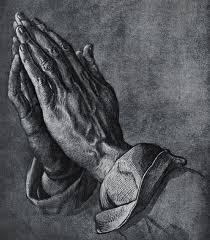Praying Hands
 Germany does not boast the most impressive array of renaissance artists, but "Praying Hands" by Albrecht Durer is a piece of such simple and deep pathos that it is almost certainly more likely to be recognized by the average protestant than the works of arguably--very arguably--greater Italian counter-parts like Ghiberti, Tintoretto, or Masaccio.
Germany does not boast the most impressive array of renaissance artists, but "Praying Hands" by Albrecht Durer is a piece of such simple and deep pathos that it is almost certainly more likely to be recognized by the average protestant than the works of arguably--very arguably--greater Italian counter-parts like Ghiberti, Tintoretto, or Masaccio.The hands pictured by Durer have seen many years. They are not straight and smooth, but course, rough, and battered by a lifetime of hard and often fruitless work.
It is the position of these hands that brought this painting to the forefront of my mind today. This afternoon my dear mother informed me of a minor war of words being waged on Facebook, which appears to have been caused by someone misunderstanding, or failing to reflect on, why some fold their hands in this position.
When I was younger, I learned to fold my hands this way in imitation of the Acolytes at my church. The young learn action by imitating those they admire, and while I was hardly a babe in arms, I was yet a little while removed from the curiosity which would question why they held their hands this way. Even at that time, however, I could understand one aspect of this posture; it was orderly. All of them had their hands folded the same way; there was no sloppiness, no "basket catching" of certain appendages. My Grandfathers had stressed the importance of posture when talking to another man, so why should it be better to stand in a slovenly manner while one is addressing God?
At the time that was enough for me, and even if the reasons above were all I had, they would yet be enough, but it was later--when I joined the Corp--that I learned the other reason for folding hands in that manner.
Reflect with me for a moment....
Why do we fold our hands? Is it merely parents setting a good example, so that their children do not squirm and pinch one another; that we might preserve ourselves from a superfluity of naughtiness?
As if having our hands busy and eyes closed for a moment could stem our sinful nature.
No. It is a reminder and a confession.
The worn, beaten, tired hands in Durer's depiction are a reminder.
A warped, sinful, and most astute German monk is reported to have said "Wir sind alle Bettler." And so Durer's hands are depicted in a position of supplication. Rudisillian Hands, Durer's "Praying Hands," Choir Hands...all are beggars hands.
The hands folded thus are a reminder to the self, and also to others, that we are all beggars; grubby, sinful, broken, and entirely unworthy of the feast to which God Himself has invited us.
That is why I fold my hands in this manner; that I might remember who I am, and who God is for me--the provider of feasts and everlasting life, to a creature, infected with death, and incapable of feeding itself. A beggar.
Now. I understand that there was also a distressing charge of pietism laid at the feet of those who fold their hands in this manner, or any who use rubrics that all Christendom has not been catechized over. There was also concern of the uncatechized being made uncomfortable by these gestures.
This whole line of argument saddens me. I would be only too thrilled to answer any questions about 'gestures' that I make during the service. But I have never been asked. I have had the pleasure of viewing multiple snide exchanges on this front, but never has anyone--outside the Rudisillian vein--ever asked me. I hesitate to toss around the favourite eighth commandment, but why do my brothers not come to me if I have made them uncomfortable, rather than go to each other behind my back.
Worship, I think all would agree, is something we engage in with the voice and the body; I admittedly take delight in discovering previously unknown (to me) hymns and rubrics for this purpose. When I see something that I am unfamiliar with, I ask about it. At the age of ten I thought crossing oneself was something Roman Catholics did, but it was through asking Pastor Gehlbach that I came to understand the significance behind the act and the remembrance of my Baptism. The fact that I was not catechized did not make crossing bad, but it did mean that I was in further need of catachesis. I still need catachesis. I will continue to need catechesis until I am with Our Lord in heaven. At which point, I have cause to hope, the contemplation of Godly things will never feel like an interminable chore.
Until then, I fold my, calloused, sweaty, corrupted hands like Durer's beggar, who awaits the day when his struggles end. A beggar who awaits the day when he will finally dine at the King's table, not as a beggar, but as family.
Wir sind alle ja Bettler.
Beautiful, Patrick.
ReplyDeleteWonderful post, Patrick! Also (and I'm so bad), when "praying hands" are sold through CPH, they are in the same posture as Durer's artwork.
ReplyDeleteThe various churches in town which I have attended recently; namely, St. Paul's, Zion, and Bethany, all practice that same posture of holding their hands that way. It is good to see.
Jacqui
At least the pastors at those churches do. I should clarify that.
ReplyDelete